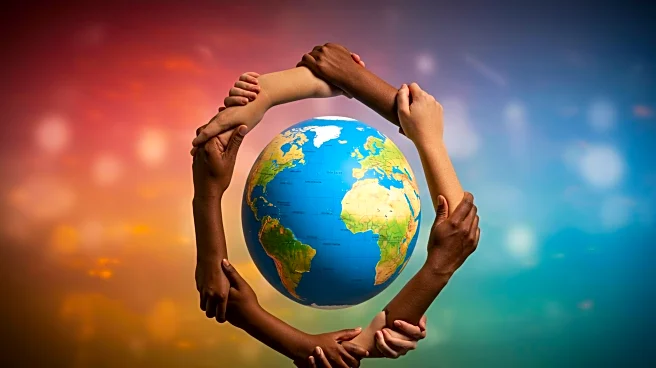What's Happening?
FIFA is introducing a new human rights strategy for the 2026 World Cup, which will be hosted in North America, including 11 U.S. cities. This initiative comes in response to past human rights controversies associated with World Cup events. The strategy requires host committees to develop action plans addressing issues such as nondiscrimination, security, and workers' rights, including those of migrant workers. Despite these efforts, human rights advocates express skepticism, arguing that the plans lack enforceable standards and clear directives. Concerns are heightened by the inability of some U.S. host committees to meet initial deadlines for draft plans. FIFA maintains that final action plans will be ready by the August 29 deadline.
Why It's Important?
The implementation of a human rights strategy by FIFA is significant as it attempts to address longstanding criticisms of human rights abuses linked to major sporting events. The strategy's success or failure could impact FIFA's reputation and influence future international sporting events. In the U.S., the strategy intersects with domestic issues such as immigration enforcement, which has been intensified under President Trump's administration. This raises concerns about potential human rights violations during the World Cup, particularly for migrant workers and vulnerable populations. The outcome of this initiative could set a precedent for how international sports organizations handle human rights issues.
What's Next?
FIFA and local host committees are working towards finalizing their human rights action plans by the end of August. The effectiveness of these plans will be closely monitored by human rights organizations and could lead to further scrutiny or adjustments. Additionally, local governments and FIFA will need to address public concerns, particularly regarding immigration enforcement and the treatment of unhoused individuals. The response from civil society and labor organizations will be crucial in shaping the implementation and oversight of these plans.
Beyond the Headlines
The broader implications of FIFA's human rights strategy include potential shifts in how international sports events are organized, with increased emphasis on ethical considerations. This could lead to more robust frameworks for protecting human rights in future events, influencing other sports organizations to adopt similar measures. The strategy also highlights the complex interplay between global sports events and local socio-political issues, such as immigration and labor rights, which may require ongoing dialogue and collaboration between international bodies and local stakeholders.










